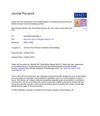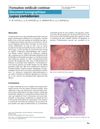 20 citations,
November 2019 in “Current Opinion in Systems Biology”
20 citations,
November 2019 in “Current Opinion in Systems Biology” The document concludes that computational models are useful for understanding immune responses and could improve cancer immunotherapy.
 20 citations,
November 2005 in “Journal of Investigative Dermatology Symposium Proceedings”
20 citations,
November 2005 in “Journal of Investigative Dermatology Symposium Proceedings” IFN-γ and IL-2 are important for T cell activation in hair loss in mice.
20 citations,
March 1990 in “Archives of Dermatology” Nonimmunosuppressive cyclosporines might treat skin diseases by affecting cell growth.
 19 citations,
March 2003 in “Journal of Investigative Dermatology”
19 citations,
March 2003 in “Journal of Investigative Dermatology” Mechlorethamine treatment regrew hair in mice by killing immune cells causing hair loss without harming hair follicles.
 15 citations,
January 2014 in “Dermatology”
15 citations,
January 2014 in “Dermatology” Some patients with a type of skin lymphoma can experience a rare, non-scarring hair loss that looks like another hair loss condition but has distinct features.
 14 citations,
March 2014 in “Journal of The American Academy of Dermatology”
14 citations,
March 2014 in “Journal of The American Academy of Dermatology” Symmetrical Acrokeratoderma (SAK) may be a unique skin condition in China, lacking specific treatment and needing long-term monitoring.
13 citations,
August 2018 in “Life sciences” Kang-ai injection with platinum-based chemotherapy improves tumor response and immune function while reducing side effects in advanced lung cancer.
 12 citations,
June 2005 in “Journal of the European Academy of Dermatology and Venereology”
12 citations,
June 2005 in “Journal of the European Academy of Dermatology and Venereology” A man with HIV developed skin and hair issues after starting HIV treatment, which improved with topical treatment.
 12 citations,
November 1996 in “Australasian journal of dermatology”
12 citations,
November 1996 in “Australasian journal of dermatology” A kidney transplant patient on cyclosporin experienced unexpected severe hair loss, which improved with treatment adjustments.
 11 citations,
April 2020 in “Journal of The American Academy of Dermatology”
11 citations,
April 2020 in “Journal of The American Academy of Dermatology” Microinflammation is more intense in smaller hair follicles and may be linked to hair loss.
 11 citations,
March 2014 in “Journal of Investigative Dermatology”
11 citations,
March 2014 in “Journal of Investigative Dermatology” Genetic mutation and carcinogen treatment are both needed for skin cancer to develop in these specific mice.
 10 citations,
October 2015 in “Journal of the International Association of Providers of AIDS Care”
10 citations,
October 2015 in “Journal of the International Association of Providers of AIDS Care” A woman with HIV had a severe skin condition that improved with antiretroviral therapy.
 10 citations,
September 2014 in “European Journal of Dermatology”
10 citations,
September 2014 in “European Journal of Dermatology” A woman's hair loss worsened after starting hepatitis C treatment due to immune changes in her hair follicles.
10 citations,
January 1997 in “The journal of sex research/The Journal of sex research” Testosterone replacement therapy significantly improved sexual interest and function in HIV+ men.
 8 citations,
August 1997 in “Australasian Journal of Dermatology”
8 citations,
August 1997 in “Australasian Journal of Dermatology” Most HIV patients develop skin symptoms that can indicate the stage of their disease.
 7 citations,
November 2007 in “Annales de Dermatologie et de Vénéréologie”
7 citations,
November 2007 in “Annales de Dermatologie et de Vénéréologie” A man was diagnosed with a rare form of lupus after showing unique skin symptoms that responded well to treatment.
 7 citations,
May 2020 in “Trends in molecular medicine”
7 citations,
May 2020 in “Trends in molecular medicine” The document concludes that the immune-inhibitory environment of the hair follicle may prevent melanoma development.
 7 citations,
October 2013 in “British Journal of Dermatology”
7 citations,
October 2013 in “British Journal of Dermatology” HIV can cause skin disorders, which are often the first sign of infection, especially in people with darker skin.
 5 citations,
September 1989 in “Journal of The American Academy of Dermatology”
5 citations,
September 1989 in “Journal of The American Academy of Dermatology” Talc in street cocaine can cause immune-reactive skin nodules where injected.
 5 citations,
April 2002 in “The American Journal of Medicine”
5 citations,
April 2002 in “The American Journal of Medicine” Hair loss can be an early sign of HIV infection.
3 citations,
January 2016 in “Journal of Clinical & Cellular Immunology” Targeting CXCL10 may help treat alopecia areata.
 3 citations,
January 2008 in “Journal of the American Academy of Dermatology”
3 citations,
January 2008 in “Journal of the American Academy of Dermatology” A patient's skin rash did not affect the area where a previous viral rash was healing, suggesting a rare immune response.
 3 citations,
January 1996 in “Pharmacotherapy: The Journal of Human Pharmacology and Drug Therapy”
3 citations,
January 1996 in “Pharmacotherapy: The Journal of Human Pharmacology and Drug Therapy” Zidovudine may cause hair loss in advanced-stage HIV patients.
 1 citations,
July 2014 in “Our Dermatology Online”
1 citations,
July 2014 in “Our Dermatology Online” The patient with both scarring and non-scarring hair loss showed complex immune reactions and improved with steroid treatment.
1 citations,
July 2020 in “Qanun Medika - Medical Journal Faculty of Medicine Muhammadiyah Surabaya” Timely treatment with antibiotics and antiretrovirals can significantly improve health in HIV patients with syphilis.
 1 citations,
January 2015 in “Advanced techniques in biology & medicine”
1 citations,
January 2015 in “Advanced techniques in biology & medicine” Down Syndrome patients with Alopecia Areata often have hypothyroidism and specific immune abnormalities.
 1 citations,
January 2014 in “The Journal of Dermatology”
1 citations,
January 2014 in “The Journal of Dermatology” A patient with Ivemark syndrome developed mixed type vitiligo after a hepatitis C infection, showing different treatment responses and immune cell involvement in the skin.
 1 citations,
September 2013 in “The Journal of Dermatology”
1 citations,
September 2013 in “The Journal of Dermatology” An 8-year-old girl developed a rare skin condition in a linear pattern on one side of her body after a lung infection, which improved with treatment.
 1 citations,
August 2007 in “Indian Journal of Pediatrics”
1 citations,
August 2007 in “Indian Journal of Pediatrics” A girl with symptoms like an autoimmune disorder actually had HIV and a fungal infection, which was hard to diagnose and treat, leading to her death.
 November 2022 in “The journal of investigative dermatology/Journal of investigative dermatology”
November 2022 in “The journal of investigative dermatology/Journal of investigative dermatology” New imaging technology can show up to 40 different markers in hair loss tissue, helping to understand hair disease better.

























